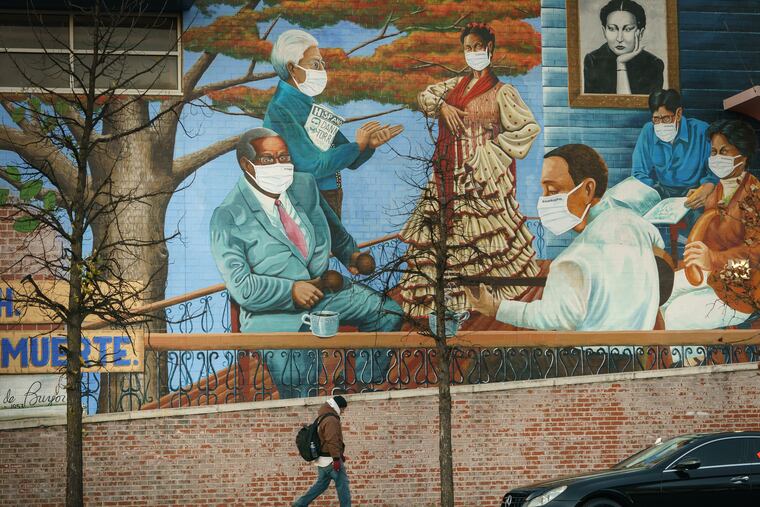Don’t let Philly’s growing Latino communities be splintered by redistricting | Opinion
Latinos in Pennsylvania are ready to be stewards of change, rather than victims of it.

For the Latino community of Pennsylvania, the 2021 redistricting process is a defining moment and we are ready to fight to protect ourselves from being cut into pieces.
The recent release of 2020 population data by the U.S. Census Bureau found exciting news for Philadelphia: The total population of the city grew 5%, or by 77,791 people, between 2010 and 2020, to hit 1.6 million. That growth was partly fueled by the expansion of its Latino community. During that period, Philadelphia’s Hispanic population grew by 27%.
The Census data also signal the real start of the reapportionment race every 10 years to redraw legislative districts at the national, state, and local levels. Where redistricting goes from here can have huge consequences for the Latino residents helping to grow our city.
» READ MORE: Philly’s population has grown to more than 1.6 million, and the region is getting more diverse
Redistricting is a double-edged sword that cuts depending on the hand that wields it. Mapmakers can redraw legislative districts to ensure that communities are kept whole to maximize the prospect of their residents and institutions working together — or they can slash neighborhoods into fragments to minimize their power.
Redistricting is not easy, but it is also not rocket science. Basic principles of geographic contiguity and demographic compactness are supposed to guide redistricting. This includes not splitting communities of interest among multiple districts when they fit into one. Communities of interest, often considered in the redistricting process, are groups of people who live in a specific location, have collective concerns, and share many things in common: customs, arts, social institutions, achievements, and challenges.
The Latino community of eastern North Philadelphia embodies the definition of a community of interest like no other. It is a self-defined group of people who share bilingual and bicultural characteristics; have their own culturally and linguistically appropriate nonprofit organizations, churches, schools, and business corridors; and live in a compact urban footprint without geographic barriers. This area is home to the nonprofit I direct, Ceiba.
The backbone of this community is a robust network of nonprofit organizations. A 2018 report by Masters of City Planning students from the University of Pennsylvania found that 15 Latino nonprofits leveraged $86 million in government grants to sustain 4,160 local jobs, generate $222 million in wages and salaries, build 1,333 new homes, and rehab nearly 10,000 housing units. While the full benefits of these investments are incalculable, they are collectively worth at least $517 million per year. At that time, these 15 nonprofits transformed the social and physical landscape for some 124,000 households and 1,900 businesses in Philadelphia.
» READ MORE: What new census data tell us about Pa.’s politics: More influence for Philly and Latinos, and a shrinking white vote
It is vital for the economic development of the commonwealth and the city to keep the community of interest that is the Latino community of eastern North Philadelphia intact and within the boundaries of one U.S. House district, one State Senate district, and one City Council district.
The importance of the Latino community to the commonwealth and the city cannot be overstated. But for the Latino community, Pennsylvania would have lost more than one seat in Congress. Pennsylvania’s population grew only 2.4% between 2010 and 2020 or by about 300,000 people. In the same period, Pennsylvania’s Hispanic population grew 45.8%, or by about 330,000 people. Growth in the Hispanic population far outpaced that of the whole state and offset the declines in population of other ethno-racial groups in the commonwealth. In other words: The Latino share of total population change in Pennsylvania was 110%.
This isn’t just the trend in a big city like Philadelphia. Allentown, Bethlehem, Reading, and many other Pennsylvania jurisdictions experienced growth in their Latino communities. The Pennsylvania legislature, the Legislative Reapportionment Commission, and their City Councils must keep these Latino communities of interest intact as they update their legislative maps.
Reapportionment should not run counter to the protections offered by the U.S. and Pennsylvania constitutions, the Voting Rights Act, and the principle of one person, one vote.
The Pennsylvania House Republican Caucus appears to understand the importance of prioritizing communities of interest in updating our legislative districts. The caucus offers those interested in providing input on the Pennsylvania congressional reapportionment process the opportunity to draw boundaries using an online mapping tool that defines and seeks information specifically on communities of interest, at paredistricting.com/input.
Although we are heartened by that acknowledgment, the Latino community will be vigilant in defending the integrity of its legislative districts. Hispanic individuals and groups in Pennsylvania look forward to ensuring that redistricting actively engages the public at every step of the process, draws maps in a manner that accurately reflects changes in our population, avoids gerrymandering, and takes affirmative steps to ensure that reapportionment does not run counter to the protections offered by the U.S. and Pennsylvania Constitutions, the Voting Rights Act, and the principle of one person, one vote.
Pennsylvania is no stranger to the old saying that no good deed goes unpunished. That is why Latinos in the commonwealth are ready to be stewards of change, rather than victims of it.
Will Gonzalez is executive director of Ceiba, a community-based organization in Philadelphia’s Latino community, and was chair of the Immigrant and Limited English Proficient Population Subcommittee of Philadelphia’s Complete Count Committee.